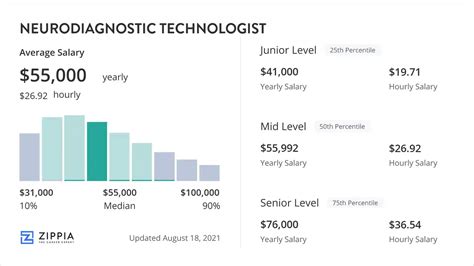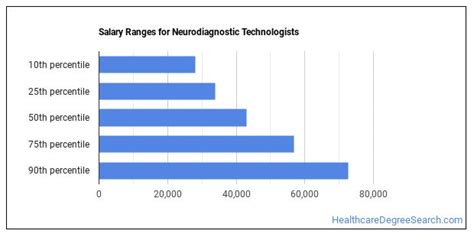For individuals drawn to a career that blends advanced technology with critical patient care, the field of neurodiagnostics is a compelling choice. Neurodiagnostic Technologists (NDTs) play a vital role in helping physicians diagnose complex conditions of the nervous system. But beyond the intellectual and personal rewards, what is the financial potential of this career?
This guide provides a data-driven look at neurodiagnostic technologist salaries, exploring the factors that can significantly impact your earning potential. On average, you can expect to earn a competitive salary ranging from $55,000 for entry-level positions to over $90,000 for experienced specialists, with a national median hovering around $70,000. Let's dive into the details.
What Does a Neurodiagnostic Technologist Do?

Before we break down the numbers, it's essential to understand the role. A Neurodiagnostic Technologist is a highly skilled allied health professional who uses sophisticated electronic equipment to record and analyze the electrical activity of the brain, spinal cord, and peripheral nerves.
Their key responsibilities include:
- Performing procedures like Electroencephalograms (EEG), Evoked Potentials (EP), Nerve Conduction Studies (NCS), and Polysomnography (PSG).
- Monitoring patients during these tests to ensure their safety and the quality of the data.
- Analyzing complex data to identify abnormalities and preparing detailed reports for neurologists and other physicians.
- Working directly with patients to explain procedures and provide a calm, reassuring environment.
They are the technical experts who provide the critical data that leads to the diagnosis and treatment of conditions such as epilepsy, sleep disorders, strokes, nerve damage, and other neurological issues.
Average Neurodiagnostic Technologist Salary

When analyzing salary data, it's helpful to look at multiple authoritative sources to get a complete picture.
According to Salary.com, the median annual salary for a Neurodiagnostic Technologist in the United States is approximately $70,590 as of early 2024. The typical salary range falls between $63,000 (25th percentile) and $77,500 (75th percentile). This indicates that the majority of practicing NDTs earn within this solid middle-class bracket.
Data from Glassdoor supports this, reporting an average base pay of around $69,800 per year.
It's important to note that the U.S. Bureau of Labor Statistics (BLS) groups Neurodiagnostic Technologists under the broader category of "Health Technologists and Technicians, All Other." For this group, the median annual wage was $59,100 in May 2023. This lower figure is likely due to the inclusion of various other technician roles. However, the data from specialized salary aggregators, which focuses specifically on the NDT role, provides a more accurate reflection of a technologist's earning potential.
Key Factors That Influence Salary

Your base salary is not a fixed number; it is influenced by several key variables. Understanding these factors is crucial for maximizing your career earnings.
Level of Education and Certification
The primary educational pathway for an NDT is an Associate of Science degree from a program accredited by the Commission on Accreditation of Allied Health Education Programs (CAAHEP). However, certificate programs are also a common entry point for those who already hold a degree in a related health field.
While the type of initial degree (Associate's vs. Certificate) has a moderate impact, professional certification has a much greater influence on salary and employability. The most respected credentialing body is the ABRET Neurodiagnostic Credentialing and Examination Board. Earning credentials such as:
- Registered EEG Technologist (R. EEG T.)
- Registered Evoked Potential Technologist (R. EP T.)
- Certification in Neurophysiologic Intraoperative Monitoring (CNIM®)
These certifications demonstrate a high level of expertise and are often required by top employers, leading to significantly higher salary offers.
Years of Experience
As with most professions, experience is a primary driver of salary growth. Employers pay a premium for technologists who have a proven track record of handling complex cases and working independently.
- Entry-Level (0-2 years): New graduates can expect to earn in the range of $55,000 to $62,000 as they build their skills.
- Mid-Career (3-9 years): With several years of experience and potentially one or more certifications, technologists can see their salaries climb to the national median and above, typically earning $65,000 to $78,000.
- Senior/Lead Technologist (10+ years): Highly experienced NDTs who take on leadership, training, or management responsibilities can command salaries of $80,000 or more.
Geographic Location
Where you work matters. Salaries for Neurodiagnostic Technologists vary significantly based on state and metropolitan area, largely driven by the local cost of living and demand for specialized healthcare.
According to data from the BLS and other salary aggregators, some of the highest-paying states for this profession include:
- California
- New York
- Massachusetts
- Washington
- Oregon
Conversely, salaries may be lower than the national average in rural areas and states with a lower cost of living. For example, a technologist in San Francisco may earn 20-30% more than one in a smaller city in the Southeast to compensate for the vast difference in living expenses.
Company Type
The type of facility where you are employed also plays a role in your compensation.
- Large University Hospitals and Trauma Centers: These facilities often handle the most complex cases, including intraoperative monitoring and epilepsy monitoring units. They typically offer higher pay, comprehensive benefits, and opportunities for specialization, but may also demand on-call availability.
- Outpatient Neurology Clinics: These settings often provide a more predictable 9-to-5 schedule. Salaries may be slightly more modest than in large hospitals but remain competitive.
- Sleep Disorder Centers: Technologists specializing in polysomnography will find ample opportunity in dedicated sleep clinics, with pay often reflecting the need for overnight shifts.
- Traveling/Contract Agencies: For-profit agencies that supply technologists to hospitals on a contract basis can offer very high hourly rates and stipends, appealing to experienced NDTs seeking flexibility and premium pay.
Area of Specialization
This is one of the most significant factors in determining your ultimate earning potential. While a general EEG Technologist earns a solid wage, pursuing advanced specializations can unlock a much higher salary ceiling.
The most lucrative specialization is Neurophysiologic Intraoperative Monitoring (IONM). These specialists work in the operating room, monitoring a patient's nervous system during complex surgeries (like spinal or brain surgery) to prevent nerve damage. Due to the high-stakes, high-stress environment, IONM specialists with the CNIM® credential can often earn $90,000 to well over $100,000 per year, according to Salary.com and industry reports.
Job Outlook

The future for Neurodiagnostic Technologists is bright. The U.S. Bureau of Labor Statistics projects strong growth for related allied health professions. For example, the closely related field of "Cardiovascular Technologists and Technicians" is projected to grow by 10% from 2022 to 2032, which is much faster than the average for all occupations.
This demand is fueled by:
- An aging population, which leads to a higher incidence of neurological and sleep disorders.
- Greater awareness and improved diagnostic capabilities for conditions like epilepsy and stroke.
- The essential role of NDTs in surgical procedures and long-term monitoring.
This robust job outlook ensures a high degree of job security for qualified and certified technologists.
Conclusion

A career as a Neurodiagnostic Technologist is a fantastic choice for those with a passion for science, technology, and direct patient impact. The financial compensation is strong and stable, with a clear path for significant salary growth.
Key Takeaways for Maximizing Your Salary:
1. Prioritize Certification: Earning credentials from ABRET is the single most effective way to increase your value and earning potential.
2. Gain Experience: Stick with the field to move from an entry-level to a senior-level salary bracket.
3. Consider Specializing: If you want to reach the highest pay scales, pursuing a specialization like Intraoperative Neuromonitoring (IONM) is the surest path.
4. Be Strategic About Location: If salary is a top priority, consider opportunities in states and metropolitan areas known for higher pay in the healthcare sector.
For those ready to invest in the necessary education and training, the field of neurodiagnostics offers not just a job, but a financially rewarding and deeply meaningful career.
